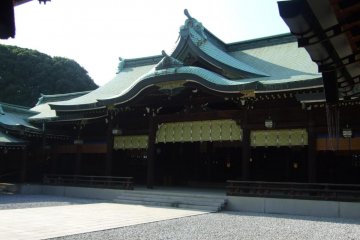
Meiji Jingu Shrine
Francesco AgrestiIn Shibuya stands a Shinto shrine honoring the deified spirits of Emperor Meiji and Empress Shouken.

Meiji Jingu is located in technologically advanced Tokyo and only a few minutes from the quirky streets of Harajuku. This famous Shinto shrine is hidden among a thickly forested area, creating an atmosphere of tranquility in the heart of Japan's bustling metropolis. Meiji Jingu is one of the most popular shrines in Tokyo and is visited by millions of people every year. The shrine’s daily ceremonies, incredible architecture, and scenic grounds make it a memorable and rejuvenating destination for tourists and Shinto practitioners alike.
History
The relatively recent shrine was built in 1920 to commemorate Japan’s first modern emperor and empress, Emperor Meiji and Empress Shoken. In 1867, Emperor Meiji ascended to the throne, effectively marking the end of Japan’s feudal era and the beginning of the Meiji Period. During his rule, Emperor Meiji guided Japan into a more modern and westernized way of life and revamped international relations by building connections with other countries. The shrine was tragically destroyed by 1945 bombings, but was quickly rebuilt in 1958 thanks to public donations.
Today
Meiji Jingu and its surrounding forest stand as a beacon of the Shinto faith, creating an atmosphere of harmony between first-time guests, practitioners, nature, and the past. Given its location in Tokyo, the easily accessible shrine is a common destination for visitors. Meiji Jingu is open every day from sunrise to sunset and has no admission fee.
The shrine has one southern entrance and two northern, all of which are marked by towering torii gates. When visitors pass under the gates, which mark the separation between the sacred and secular world, it is customary to bow. The path to the shrine’s main complex is lined by a lush forest composed of over 100,000 trees and a variety of plant species, many of which were donated to the area from all over Japan. The densely wooded area effectively blocks out the sights and sounds of Tokyo, enveloping visitors in an environment of zen where they can clear their minds as they walk to the main shrine entrance. Once visitors step across the threshold onto the main grounds, they can leave their everyday worries behind and immerse themselves in the shrine’s architectural beauty and Shinto practices.
Standing at 12 meters tall and 17.1 meters wide, Ootorii is the largest wooden myojin-style torii in Japan. The original gate was destroyed by lightning in 1966, but was reconstructed by 1975 with a Japanese cypress that was more than 1,000 years old as the building material. The gate’s sheer size is breathtaking and speaks volumes to the sacredness of the shrine. For many visitors, Ootorii will be the second torii gate they walk through during their journey to the main shrine grounds.
The Main Hall or Honden is Meiji Jingu’s most impressive and sacred building; it is where the kami deities are enshrined. After guests pass under Minami Shinmon, which is the gate to the main complex and one of the shrine’s few original structures, they are greeted by a massive wooden building. The Main Hall is built in the nagare zukuri architectural style with one defining characteristic being its asymmetrical roof, which is longer in the front than the back to shelter the front steps. The Honden is constructed from Japanese cypress trees and has copper roofs, creating a humble presence that is in harmony with the natural environment. The Main Hall is home to numerous Shinto rituals and prayers and includes the Shinto prayer recital hall, inner shrine hall, and outer shrine hall. The Honden is a defining feature of the shrine and a must see given its traditional architecture and integration into the daily Shinto practices.
One of the most serene areas of the shrine is the Inner Garden, which is located on the southern end of the grounds and has a 500 JPY admission fee. The garden, which is said to have been commissioned by Emperor Meiji for his wife, is a stunning scene that shines in all seasons with artfully crafted greenery, ponds, and even a traditional tea house. One of the most popular times to visit the Inner Garden is in June when the area’s abundance of purple irises are in full bloom. Another notable spot is Kiyomasa’s Well, which is named after the military commander who dug it. People frequent this area since the well is considered a “power spot” that gives off positive energy. [Tea House Photo: Sean Marshall / CC BY-NC 2.0]
The Treasure House, located on the northernmost end of the shrine grounds, houses historical artifacts and personal belongings of Emperor Meiji and Empress Shoken. [Photo: David Manuel / CC BY-NC-ND 2.0]
For an immersive experience, guests can learn about the Shinto religion by partaking in traditional practices, such as making offerings and praying at the main hall, writing wishes on ema amulets, and purchasing fortunes or protective charms. When visitors enter the main shrine complex they can also visit the Temizusha, to wash your hands and cleanse mouths. The shrine is foreigner-friendly with English signage to aid first-time practitioners in their spiritual journeys.
Meiji Jingu hosts numerous festivals and events year-round. The shrine starts the year with the New Year’s Day Ceremony or Saitan-sai and during the first few days of the year the shrine is flooded with over three million people praying for good fortune. Other notable festivals are the Spring Grand Festival or Sukeishatai-sai on May 2nd and 3rd; National Foundation Day Festival or Kigen-sai on February 11th; and Autumn Grand Festival on November 3rd, which celebrates Emperor Meiji’s birthday. During these festivals the shrine comes to life with traditional music, dance, and theater performances. Apart from the grand festivals, Meiji Jingu also performs daily rituals, such as Nikku-sai, which is a daily food offering to the kami that occurs from 8:00 to 14:00. The shrine is also a popular place for traditional Shinto weddings, and if visitors are lucky, they may catch a glimpse of the procession. With the shrine’s busy schedule, visitors can witness Shinto events year-round.
Recently constructed in October of 2019, Meiji Jingu Museum is regarded for its elegant design by famous architect Kuma Kengo. The open floorplan surrounded by peaceful forest creates an elevated viewing experience. The museum contains items used or associated with the emperor and empress, such as writing utensils, a desk, and even an opulent carriage that the emperor rode. Admission to the museum costs 1,000 JPY.
Meiji Jingu’s location in Tokyo makes it easily accessible via public transportation and is minutes away from a number of train stations by foot. Please note that the travel times below are calculated using the shrine entrance as the endpoint. It will take about another 10 minutes for visitors to reach the main shrine grounds.
Closest access:
The shrine is a 1-minute walk from either Harajuku Station on JR Yamanote Line or Meiji-jingumae Station on Tokyo Metro Chiyoda and Fukutoshin Lines.
Other nearby stations:
Sangubashi Station on Odakyu Line: 3-minute walk
Yoyogi Station on JR Yamanote Line, JR Chūō Line, Sōbu Line, and Toei Oedo Line: 5-minute walk
Kita-Sando Station on Tokyo Metro Fukutoshin Line: 5-minute walk

In Shibuya stands a Shinto shrine honoring the deified spirits of Emperor Meiji and Empress Shouken.
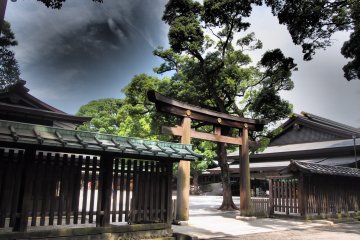
Visit Tokyo’s popular Meiji-Jingū to see a Shinto shrine. Meiji-Jingū is both architecturally impressive and culturally significant, as Shinto is called Japan’s ancient original religion.
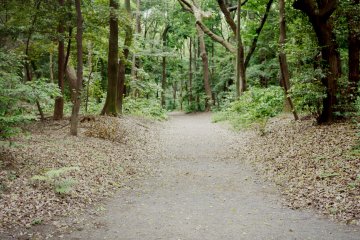
The Meiji Shrine is one of the most popular shrines in Tokyo, constructed in 1926 and dedicated to the spirits of emperor Meiji and empress Shoken. It is located at the heart of a beautiful, quiet forest just moments from Harajuku Station
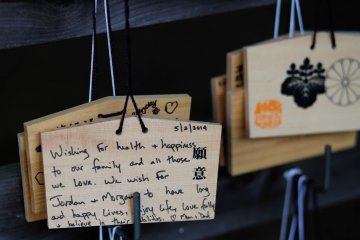
They are called ema and they are small wooden tablets used by worshippers to write down their prayers or wishes. The tablets are left in a designated area at the shrine, a traditional way of sending their prayers to the gods. Have you made your wish already?
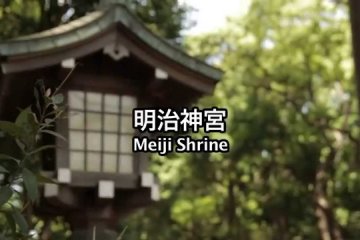
Meiji Jingu is an impressive shrine constructed in honor of Emperor Meiji and Empress Shoken who ruled Japan during the early 20th century.

Not that Meiji Shrine in Tokyo itself isn't worth a visit, but combining it with a glimpse of a traditional Japanese Shinto wedding couple is quite something.

See ema wooden plaques written not only in Japanese, but also in various foreign languages.

Meiji Jingu is a Shinto Shrine shrine dedicated to the deified spirits of Emperor Meiji and his consort.

A short photo story of the Meji Shrine in Tokyo on a foggy day of June.
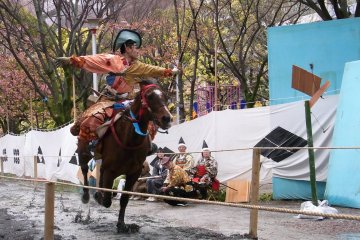
A demonstration of the traditional martial art of yabusame mounted-horse archery will be held on 3rd November at Meiji-Jingu Shrine in Harajuku, Tokyo. The event is free and begins at 1:00pm.

Some interesting trivia, as well as a historical narrative of one of Japan's most celebrated shrines - Meiji Jingu, or Meiji Shrine, Tokyo.

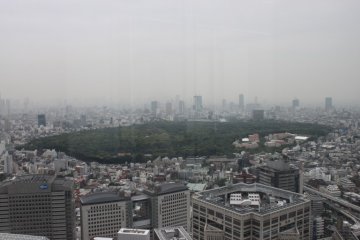
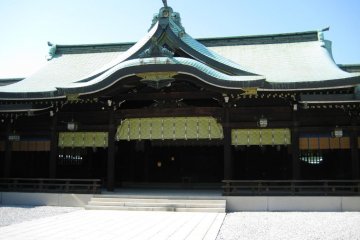
Meiji Jingu is an impressive shrine constructed in honor of Emperor Meiji and Empress Shoken who ruled Japan during the early 20th century. Emperor Meiji was the first ruler of modern Japan and helped end Japan's feudal era. This move helped to westernize and modernize Japan to make it into the world power that it is today.
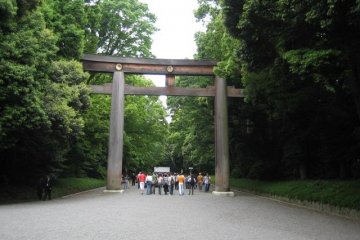
Meiji Jingu is a beautiful, peaceful Shinto shrine with a lot of history and makes feels like you were away from the hustle and bustle of Tokyo.
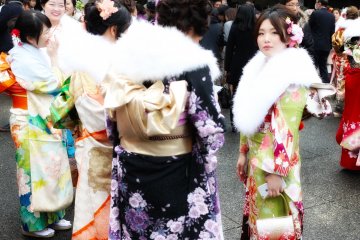
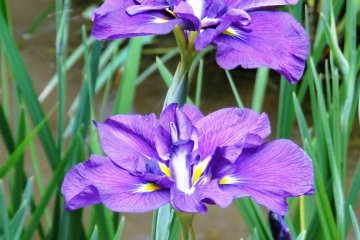
Catch irises in bloom in the inner garden of Tokyo's Meiji Shrine during the rainy months of May and June

The Inner Gardens of Meiji Jingu are a large, natural area connected to the famous shrine. The gardens include a large pond filled with colorful koi, winding forested paths, and an iris garden that blooms brilliantly every June. Also take a visit to Kiyomasa's Well, a famous "power spot" that attracts visitors seeking positive and lucky energy.

Enjoy a stroll through Meiji Shrine and visit the bonsai and suiseki exhibition which happens every year in June. Bonsai is a hobby enjoyed by many people that has been practiced in Japan for over a thousand years. Take a break in the shade and contemplate bonsai at its best!
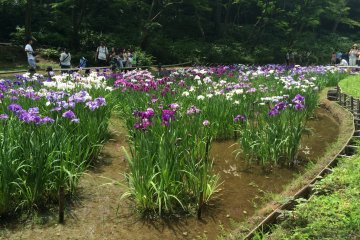
Walk amongst a grove of irises at Meiji Shrine in Tokyo in springtime.
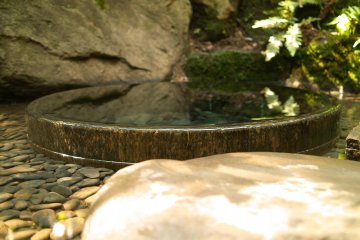
Kiyomasa's Well is located within Meiji Jingu in the Inner Garden. A Tokyo 'power spot', the well is famous for its postive energies and was believed to have been struck by the feudal lord Kato Kiyomasa.

Iris Fields in Meiji Jingu: In June, more than 2000 iris flowers are in bloom at the inner garden of Meiji Jingu (Shrine).
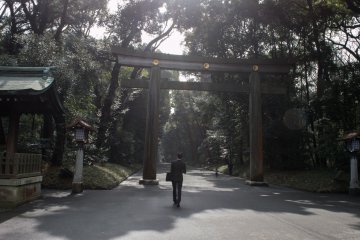
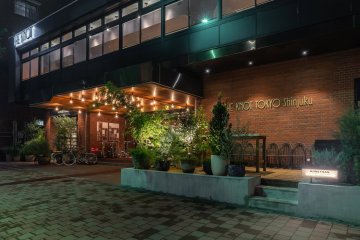
Located right next to Shinjuku Chuo Park, THE KNOT TOKYO Shinjuku is a modern hotel with an exceptional design and easy access to the nearby Shinjuku train station and the Meiji Shrine. The 14-story hotel building was renovated and reopened in August 2018 as THE KNOT TOKYO Shinjuku . The western-style rooms offer a park view on the top floor as well as a newly opened terrace suite. The spacious atrium design offers a relaxed atmosphere and connects the restaurant, bar, lounge and lobby with one another. One of the highlights of THE KNOT is the delicious dishes. There are six areas in which food and drinks are offered. From the grill area to high-quality black tea and fresh bread, everything is on offer.

With Koenji being a "creative town" it's no surprise that the BnA Hotel opened there in 2016 and has had, subsequently, an incredible impact on the local community. BnA (Bed and Art) has other spaces dotted about Tokyo and Kyoto, but the Koenji edition is possibly more immersive as the concept is "stay in an artwork." In collaboration with local artists, the BnA has created an impressive multi-storey art experiment for art lovers and creatives with a desire to inhabit art. The first floor acts as a front desk and bar which comes alive at night with events and selected DJs. It also hosts Masu Masu onigiri cafe with artists being asked to come and exchange artwork with each other in a gesture which reflects the true spirit of Koenji. With two "living art" twin rooms taking up the second and third floors designed by a seasonal rotation of local artists, guests can engage with and inhabit their art rooms. BnA Koenji also plays host to a rooftop lounge and a basement space which is used for artists residencies where their work is shown to the public and a DJ booth and streaming equipment for live performances. With live painting events and an eclectic variety of regular events, the BnA Hotel becomes, itself, a living canvas. The BnA believes that it's a machigata hotel, meaning that guests should (and are encouraged) to interact with Koenji. Use the public sentos, eat in the local restaurants that surround the hotel and buy locally from the multitude of shops, market stalls, bars and cafes which make-up the fabric of Koenji. Feted by international press such as The Guardian, BnA acts as a creative network with the concept of serendipity being discussed as the bar becomes an ad hoc meeting place where collaborations and friendships between artists and locals are born. The BnA was also instrumental in a street art festival named MCP (Mural City Project) which was supported by Suginami Ward. MCP was incredibly ambitious and truly communal with the desire to transform and coalesce the community through the creation of public murals. The BnA, Koenji and Suginami spearheaded a public art movement which should be commended and replicated throughout Tokyo.
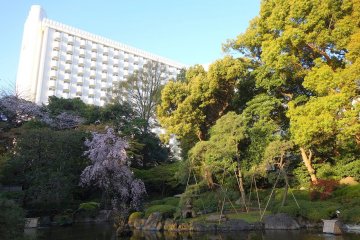
Just minutes from Shinagawa Station, the Grand Prince Hotel New Takanawa is surrounded by lush greenery in the Takanawa area, with rooms offering balcony views of the nearby gardens and the surrounding Tokyo cityscape. This urban resort features convention facilities like the Hiten banquet hall, the international Convention Center Pamir, as well as a wide variety of Japanese, Chinese and Western restaurants.

Mame Shiba Cafe offers a unique experience where you can interact with Shiba dogs while enjoying your favorite drinks. You cannot make reservations in advance through phone or online, so it is best to book early in the morning at a store. The cafe requires customers to make a reservation in-store, present their receipt at the reserved time, and then enter the cafe.

B-Flat Commune is an open-air hangout in Omotesandō featuring a variety of stalls and food trucks offering unique drinks, clothing, and bites to eat. Its relaxed vibe and plenty of seating make it an ideal spot for casual meetups and spending time with friends. It's a creative place where people can gather to eat a the open-air dining space or purchase fashion, antiques, product goods and other lifestyle items. Events are sometimes hosted at this community space, and operating stores may change from month to month.

If you're a fan of Quentin Tarantino’s Kill Bill, there's one Tokyo restaurant that absolutely deserves a spot on your bucket list. While you may not know it by its real name, chances are you've seen it on screen—it’s the unforgettable setting for the iconic, over-the-top showdown between The Bride and the Crazy 88. Known affectionately by fans as “The Kill Bill Restaurant,” this venue offers more than just cinematic nostalgia—it's a vibrant and unique dining experience in its own right. Located in Tokyo’s upscale Nishi-Azabu district, this classic-style izakaya bar is where fiction meets flavor. Though the fake blood and samurai swords have long been cleaned away, the spirit of the film lives on in the architecture and atmosphere. Stepping inside feels like walking onto the set: a grand, high-ceilinged hall with a central open-plan dining space, surrounded by a mezzanine-level balcony—instantly recognizable to anyone who’s watched the movie. But don’t mistake it for just a movie-themed attraction. The Kill Bill restaurant is a serious culinary destination. It offers a wide variety of traditional Japanese dishes, from sashimi and grilled skewers to noodle dishes and seasonal specialties. The menu also boasts creative fusion items like avocado and camembert tempura, which nods to the restaurant’s global popularity and mindset. And for international travelers with specific dietary needs, the restaurant provides vegan and halal-friendly menus (with at least three days’ notice). What makes this spot truly special is its ability to deliver a top-tier gourmet experience while doubling as a pop culture pilgrimage. You can sip sake where Uma Thurman once sliced through waves of enemies—minus the chaos, of course. Whether you’re a die-hard Tarantino fan, a foodie on the hunt for authentic Japanese flavors, or simply someone looking for a unique night out in Tokyo, this restaurant checks every box. Just one tip: Enjoy the drinks and dishes, but leave the swordplay to the professionals. Note: As you’d expect, Gonpachi is a popular restaurant. Same-day reservations are possible, but ideally you’ll want to reserve your table at least two days ahead of your visit, and even earlier if you’re planning to visit at the weekend.

As one of the largest green spaces in Tokyo, Yoyogi Park is a magnet for Tokyo residents who want to enjoy the sun and nature or who would like to attend one of the many festivals that take place in the park all year round. Although Yoyogi Park has relatively few cherry trees compared to other parks in Tokyo, it is a beautiful vantage point for the cherry blossom in spring. He is also known for his ginko trees, which turn gold in autumn. Before the park became a city park in 1967, the area was the site of the Olympic Village for the 1964 Olympic Games. Yoyogi Park is right next to the Meiji Shrine.
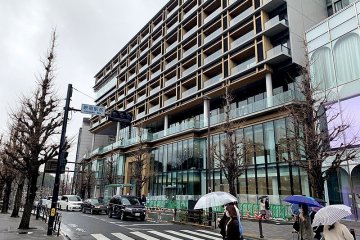
With easy access from Harajuku Station, ‘With Harajuku’ is the premier shopping and residency space for the glamourous fashion Mecca. At With Harajuku, residents can be an active part of the quickly changing trends of Tokyo. In addition to the living area, visitors to the area can take advantage of With Harajuku’s great shopping and dining offerings, including a new Ikea.

The Tōgō Shrine was established in 1940 and dedicated to Gensui The Marquis Tōgō Heihachirō shortly after his death. This shrine was destroyed by the Bombing of Tokyo, but was rebuilt in 1964. It is located in Harajuku, Tokyo, Japan. There, The Marquis Tōgō Heihachirō is celebrated as a shinto kami. [Wikipedia]